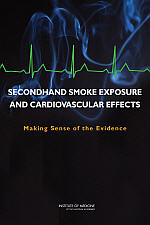Smoking Bans Could Prevent Tens of Thousands of Heart Attacks Every Year
New Institute of Medicine Report Finds Even Brief Exposure to Secondhand Smoke Can Trigger a Heart Attack
Tobacco smoke can cause health problems not only for smokers, but also for people around them. Breathing secondhand smoke increases a person's risk for a heart attack and other heart conditions.1
Learn More About the Relationship Between Secondhand Smoke and Heart Disease
NEW! Institute of Medicine Report: Secondhand Smoke and Cardiovascular Effects: Making Sense of the Evidence
 |
Secondhand Smoke Exposure |
The science is consistent, according to the Institute of Medicine (IOM). In the new report, Secondhand Smoke Exposure and Cardiovascular Effects: Making Sense of the Evidence, the IOM draws clear links between secondhand smoke and heart disease and heart attacks.2 After an extensive review of scientific studies, the report documents the effects of secondhand smoke, including the following:
- Secondhand smoke can cause a heart attack.
- It is possible that even brief exposure to secondhand smoke could trigger a heart attack.
- Smoke-free air laws result in fewer heart attacks.
The Centers for Disease Control and Prevention, Office on Smoking and Health, asked the Institute of Medicine to bring together an expert committee to review the current science on the relationship between secondhand smoke exposure, both long and short-term, and heart attacks.
Visit the CDC Office on Smoking and Health Web site for more detailed information about the IOM Report on Secondhand Smoke Exposure and Cardiovascular Effects including
- Analysis of the report findings
- Animation of how secondhand smoke affects the cardiovascular system
- CDC statement on report findings
More Information
- Secondhand Smoke Causes Heart Disease
CDC Office on Smoking and Health Fact Sheet
- The Health Consequences of Involuntary Exposure to Tobacco Smoke
2006 Surgeon General's Report
- MMWRs on Secondhand Smoke
CDC Morbidity and Mortality Weekly Reports
References
- U.S. Department of Health and Human Services. The Health Consequences of Involuntary Exposure to Tobacco Smoke: A Report of the Surgeon General. Atlanta, Georgia: U.S. Department of Health and Human Services, Centers for Disease Control and Prevention, Coordinating Center for Health Promotion, National Center for Chronic Disease Prevention and Health Promotion, Office on Smoking and Health; 2006.
- Institute of Medicine. Secondhand Smoke Exposure and Cardiovascular Effects: Making Sense of the Evidence. Washington, D.C.: National Academies Press; 2009.
Get email updates
To receive email updates about this page, enter your email address:
Contact Us:
- CDC/NCCDPHP/DHDSP
4770 Buford Hwy, NE
Mail Stop F-72
Atlanta, GA 30341-3717 - Call: 1-800-CDC-INFO
TTY: 1-888-232-6348
Fax: 770-488–8151
- cdcinfo@cdc.gov



